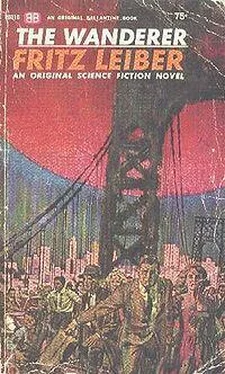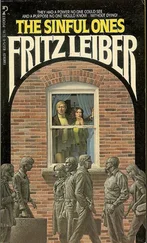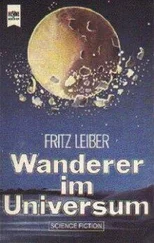There was a zing and a crack and the tubular chrome rang along its length. Sally flipped her hands off it as if she’d been stung and turned around.
“Somebody just shot at me!” she announced indignantly.
“Move back, baby,” Jake instructed her. “People are always jealous of the guy at the top. Or the gal.”
The saucer students heard four rapid horn-beeps which came winging back through air heavy with the sour, acrid fumes of burnt-over land — and reeking more than ever since a hot, damp wind had set in from the southeast. Overhead the sun was hot but there was a big black cloudbank to the south.
Hunter brought the sedan to a stop behind the Corvette, which had just topped a rise, the road passing between two natural rock gateposts some fifteen feet high.
Doc was standing in the seat, studying the terrain ahead. He looked just a little like a pirate, with the brim of his black hat pulled down in back but turned up sharply in front. He reached out his right hand, and Rama Joan put the field glasses into it. He resumed his scanning, using the seven-power instrument. Rama Joan and Ann stood up, too.
Hunter stopped the sedan’s motor, set the brake, and as the school bus drew up behind them third in line, he and Margo got out and hurried forward until they could see, too.
In front of them a slope stretched downward for a quarter of a mile in gentle undulations to a broad-ditched flat, then rose again, though not so high.
The slope was black to the left, dusty greenish-brown to the right. Monica Mountainway went down it in swinging curves, crossing and recrossing the demarcation line between the burned and the unburned.
Toward the bottom, almost on the demarcation line, it passed three white buildings surrounded by a wide graveled space and a high, wire-mesh fence. Then the road joined the broad-ditched fiat which led off in either direction, almost level but gently curving, until the hills hid it each way.
Down the center of the flat, following its contours, stretched what looked for a long moment exactly like a miles-long, flattish, scaly serpent thirty yards wide. The individual scales, which ran in glitter-bordered rows eight or nine across, were mostly blue, brown, cream and black, though here and there was a green or red one. Judging by its glittering sides, the serpent had a silver belly.
Wojtowicz, coming up behind them, said, “Cripes, we’re there. That’s it. Wow!”
The scaly serpent was inland Route 101, jammed with cars bumper to bumper. The glitter-border was the freeway’s wire-mesh fence.
Doc said hoarsely, “I want to talk to Doddsy and McHeath.”
Rama Joan said, “Ann, you can get them.” The little girl climbed past her mother and hopped out.
As soon as Hunter’s and Margo’s eyes stopped swinging and started to linger, details began to destroy the serpent illusion. At many spots cars had been driven wide on the shoulder, up against the fence. Some of these had their hoods up and dabs of white at their sides — Hunter realized these last must be towels, shirts, scarves, and large handkerchiefs: pitifully obedient “askings for assistance” set up before the jam got impossible.
At several points the serpent scales were twisted and whorled: accidents never cleaned up and attempts of whole groups of cars to turn and go back the way they’d come, either by crossing the median strip or by using the shoulder.
At three places the wire-mesh fence bulged acutely outward, each bulge filled with cars nose-on: these must have been trying to ram their way out. One of these attempts had been limitedly successful: the fence was down, but the way out beyond it blocked by a mess of cars ditch-overturned and crushed together, two half-climbed onto the others’ backs.
Here and there a few cars still moved in senseless-seeming, backward and forward jerks of a few feet each way. Stale exhaust-stench mixed with the burnt reek coming on the moist southeast wind.
Hunter thought of what it must have looked like at night in the last stages of general movement: five thousand cars in sight from here, ten thousand headlights swinging and blinking, ten thousand bumpers to clash and snag and rip, a few police speeding up and down trying to keep open lanes that relentlessly shortened and narrowed, five thousand motors, belching exhaust pipes, horns…And about a hundred thousand more cars between here and L.A.
He heard the Ramrod saying, “It is the valley of dry bones. Lord of the Saucers, succor them.” From the car beside him Rama Joan said softly: “Even an evildoer sees happiness so long as his evil deed does not ripen; but when his evil deed ripens…”
The biggest and worst car-crush of all was where Monica Mountainway entered 101 just beyond the three white buildings: a hundred or so cars slewed every which way, several overset, others ditch-jammed sideways, and the nearest three dozen burnt black — it occurred to Hunter that he was very possibly looking at the source of the brush fire.
Only after he and Margo had studied the cars for quite a while (or for an interminable, incredulous, eye-darting moment) did they begin to see the people. It was as if some universal law forced vision to descend by size-stages.
People! — three or four to each car, at least. Many of them still sitting in them, by God. Others standing or walking between them, a few standing or sitting on fabric-or-cushion-spread car roofs. Off to the left, beyond the burnt swathe, many people had climbed the fence and set up blanket-and-beach-towel-shaded bivouacs, yet few if any of them seemed to have gone far from the freeway that penned their vehicles; perhaps they figured the jam would be cleaned up somehow in a few hours or a day. And there wasn’t much walking around — they were sticking to the shade.
It was a stale old joke, Hunter recalled, that Angelenos, using cars even to visit the people across the street, had forgotten how to walk — one of those jokes that are little more than the unretouched truth.
Just to the left of the Monica Mountainway outlet and car-crush, a clutch of black and white police cars was drawn up on a cleared stretch of shoulder, in a semicircle reminiscent of a wagon-train camp. This “laager” guarded a car-wide break in the fence, looking as if it had been done with heavy wire-clippers. A half-dozen police were inside it, and right now one of them took off on a motorcycle through the break, immediately turning and gunning along north on the flat outside the fence. A few people came out of their bivouacs and seemed to hail him, but he kept on, and they stood there as his dust-wake broadened and billowed around them.
To the right, where the big black cloudbank was growing rapidly higher, there were fewer bivouacs but more people in the open — slim people moving around fast, mostly, waving and leaping, gathering in clumps, dispersing, regath-ering. And it seemed to be from this direction that there, was coming, quite tinny and faint, the squawk and squeal and drumbeat of jazz.
Between the two groups of people behaving so differently, there was a hundred-yard stretch, including the Mountainway outlet, that had no people at all in it, even sitting in the cars — except for ten or so stretched here and there on the ground. Hunter wondered for a moment why they chose to rest in the baking sun, before it occurred to him they were dead.
He was fringe-aware of his comrades from the school bus and the truck gathered around the Corvette, too. Now he beard more footsteps coming and the Little Man saying, “Look at that cloudbank. I don’t know that I’ve ever heard of a wet southeast wind like this in Southern Cal,” and McHeath replying, “Maybe the ocean’s broke through and filled the Salton Sea and other low spots, Mr. Dodd. And with — gee! — maybe a hundred miles of tidewater, there’d be lots of evaporation.” Hunter continued to scan the overpowering scene ahead.
Читать дальше










